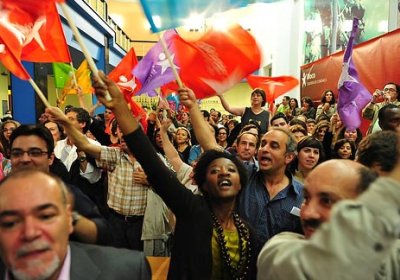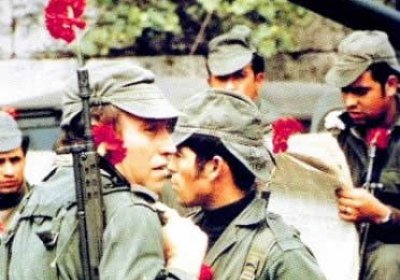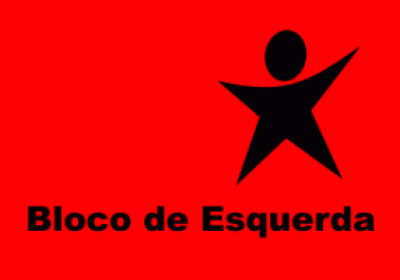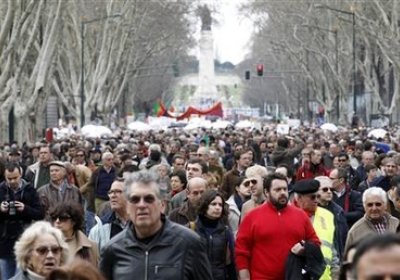Portuguese President Anibal Cavaco Silva said he will not allow a coalition of left parties to form a government, despite the fact that they won an outright majority in October 4 parliamentary elections - on grounds it would "violate" existing commitments to the European Union.
Portugal
 Activists wave left Bloc flags.
Will Portugal finally see the end of the austerity imposed over four years by the right-wing coalition of the Social-Democratic Party (PSD) and Democratic and Social Centre—People's Party (CDS-PP)?
Activists wave left Bloc flags.
Will Portugal finally see the end of the austerity imposed over four years by the right-wing coalition of the Social-Democratic Party (PSD) and Democratic and Social Centre—People's Party (CDS-PP)?
Will Portugal finally see the end of the austerity imposed over four years by the right-wing coalition of the Social-Democratic Party (PSD) and Democratic and Social Centre—People's Party (CDS-PP)?
Massacre is an explosive theatre work about the politics and violence of East Timor. Produced by Stone/Castro (Australia) and Colectivo 84 (Portugal), it features John Romao as “Timor” and Paulo Castro as “East”.
They work with “weapons of grotesque, sarcasm and a thrash metal soundtrack to create a scenic, hypnotic and dangerous game. The mutant metamorphosis of Australia, Indonesia and Portugal make for an in-your-face confrontation to the East Timor crisis.”
The Portuguese tax-haven and tourist island of Madeira — a watering hole of Europe's super-rich — was the unlikely site of gains for the Left Bloc and the anti-corruption citizens’ movement Together for the People (JPP) in March 29 elections for the autonomous region’s legislative assembly.
The JPP, whose lead candidate Elvio Sousa promised “a different way of doing politics … favouring the most victimised and the middle class”, won five seats (10.34%) in the 47-seat legislature.
What does the victory of radical left party SYRIZA in Greece's January 25 elections mean for politics in Europe, at Europe-wide and national levels? Both levels are closely intertwined, and since SYRIZA’s win have been having rapid feedback effects on each another.
Across Europe, the reverberations of SYRIZA’s win are being felt with rising force, both in “peripheral” Europe, but also in the German-led European Union “core”.
Three years ago the Portuguese government, unable to raise funds on the capital markets, went for help to the infamous troika ― the combination of the International Monetary Fund, European Central Bank and European Union. In return for their bail-out, the troika imposed punitive conditions that have wrecked livelihoods.
In Portugal last September, the negative impact was expressed for me in one biting comment: “They are draining the life blood from Portugal.”
The results of the September 28 Portuguese local government elections would seem obvious: the big winner was the opposition Socialist Party (SP), and the big loser the governing alliance of the Social Democratic Party (PSD) and the Democratic and Social Centre—People’s Party (CDS-PP).
The pattern was the same at all three layers of local government for which the Portuguese vote — municipal assemblies (councils in Australia), municipal chambers (the councils’ full-time executives, headed by the mayor), and parish or ward committees.
The June 27 general strike in Portugal, the fourth since the country became an economic protectorate of the European Commission, European Central Bank and International Monetary Fund “troika” in 2011, was marked by several important firsts.
It was the largest general strike to date, with 80%-100% support from public sector workers and a clear rise in support from private sector workers.
Francisco Louca is an economics professor at the Technical University of Lisbon. Louca was part of the student movement against the Salazar dictatorship in the 1970s. He was a founding member of the Left Bloc, launched in 1999 when several left groups united. He served as the Left Bloc's chief coordinator between 2005 and last year. He was interviewed by Mark Bergfeld, a London-based socialist activist. The interview is abridged from MRZine.
* * *
The 39th anniversary of Portugal’s 1974 “revolution of the carnations” that overthrew a 48-year-long dictatorship, was marked on April 25 by a huge march against austerity in Lisbon.
The symbols of that revolution — the carnations and the song “Grandola, Vila Morena” (broadcast in the early hours of April 25, 1974 as the signal to start the revolt )— were massively present.
They now stand for the need for another rebellion, this time against the austerity imposed on the country by the “troika” -- the European Union, European Central Bank and International Monetary Fund.
Whenever there is a protest in Portugal you are almost certain to hear the haunting song “Grandola, Vila Morena” (“Grandola, sunburnt town”), with its line “who most rules within you, O city, is the people”. On March 2, at huge protests across Portugal, “Grandola, Vila Morena” was sung by more voices than ever before.
- Previous page
- Page 2
- Next page







